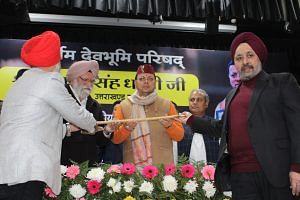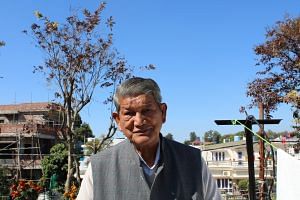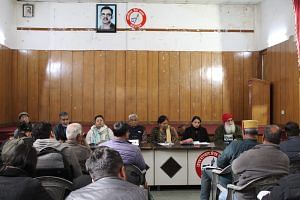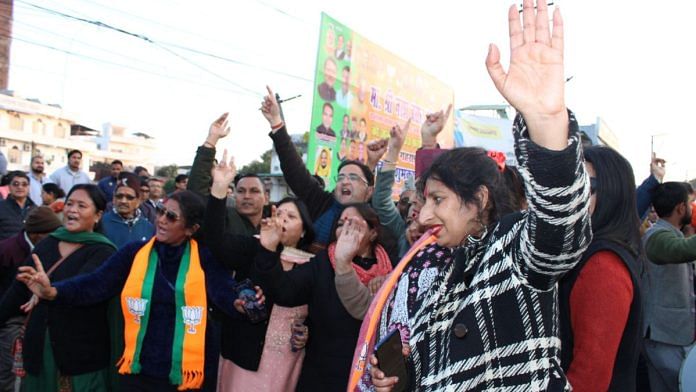Dehradun: The women danced, the drum beats intensified, and chants of ‘Jai Shri Ram’ and ‘Dhami-Dhami’ erupted outside Dehradun’s Vikas Bhawan as Uttarakhand became the first state in India to implement the Uniform Civil Code. The moment the Bill was passed on 7 February, Bharatiya Janata Party workers burst crackers to celebrate their victory. Next will be Assam and then Gujarat, they said in jubilation.
A few kilometres away, PhD scholar Karishma* (29), a Dalit, and her live-in boyfriend Pratik* (30), a Brahmin, are contemplating leaving Uttarakhand. The UCC Bill, now set to become an Act, makes it compulsory for couples living together to register their relationships—failing which they can face jail time. Only tribal communities are exempt from following the Bill that proposes common rules for marriage, divorce, inheritance, and live-in relationships irrespective of religion.
For the tiny hill state, where the BJP has held power since March 2017, the passing of a uniform civil code fulfils a poll promise made by the Pushkar Singh Dhami government. It was the next logical step in the Sangh Parivar agenda after the construction of the Ram temple in Ayodhya.

But there are rumblings of discontent and dismay on the ground. Minority communities fear that the UCC will be used to clamp down on interfaith relationships and Hindu-Muslim couples. Organisations like the Uttarakhand Mahila Manch warn that it will increase violence against women, while others are upset with the Dhami government for prioritising a uniform civil code over stringent land laws.
“Policy, intention, and leadership are necessary for a political party. Modi ji had a strong desire to implement the UCC. Under his guidance and inspiration, we have passed the UCC in the state legislature,” said parliamentary affairs minister Premchand Agrawal.
The UCC was years in the making. For the Dhami government, it’s fitting that the ‘land of the gods’ or Devbhoomi Uttarakhand—home to Uttarkashi, Haridwar, Rishikesh, Badrinath, and Kedarnath—take the first step towards implementing the common civil code.

Many expected Uttar Pradesh, Assam, or Gujarat to push for a uniform civil code, but Uttarakhand beat them to the punch barely two months before the country goes to polls.
In comparison to its larger neighbour Uttar Pradesh, where the Yogi Adityanath government and Ayodhya have dominated the national news cycle, the rising saffron tide in Uttarakhand and simmering tensions have, for the most part, gone under the radar. The communal clash at Haldwani on 8 February that resulted in the deaths of five people and the government issuing shoot-at-sight orders is the latest episode of violence. In May last year, Purola town saw a communal flare-up.
According to political analyst Rashid Kidwai, the UCC Bill was an “experiment” with the least repercussions had it failed. If the BJP suffers losses in any of the big states, it would have ramifications across India, leading to “greater social disquiet,” he explained. “Given Uttarakhand’s size, the political fallout, if it failed, would have been controllable. That said, it’s a small state with a formidable Lok Sabha.” Uttarakhand sends five MPs to the lower house.
Also read: Kuki-Zomi women have left home to protect the homeland. They’re patrolling the ‘frontline’
UCC was next for BJP—Uttarakhand stepped up
At the Congress headquarters on Rajpur Road in Dehradun, strategist Prem Bahukhandi sits with his laptop open, writing a speech. ‘Has your party turned the state into a laboratory?’ he writes, questioning the BJP. Strong words, but he’s resigned to the fact that Uttarakhand’s Uniform Civil Code is here to stay.
After winning the assembly election in 2021, Dhami appointed a five-member panel headed by retired Supreme Court judge Ranjana Desai to work on the UCC draft.

“The BJP knew that there would be no challenge or opposition to implementing the UCC in Uttarakhand,” he said. With the BJP holding 47 seats in the assembly, and the Congress only 19, the Bill was sure to be passed. “That’s why the central government chose the state as a test case. With these numbers, there was no strong opposition against it.”
For state BJP members, it’s fitting that Uttarakhand is the first state to pass the UCC Bill.
“After the inauguration of the Ram temple in Ayodhya, there has been a strong religious sentiment among the people. The BJP implemented UCC in Uttarakhand to minimise opposition and keep that religious sentiment alive” said Uttarakhand-based activist Kamala Bisht.
According to political analysts, Prime Minister Narendra Modi has been paying close attention to the hill state. In December 2023, he inaugurated the Uttarakhand Global Investors Summit to promote the state as a major investment destination. Prior to the two-day summit, he inaugurated and laid the foundation of 23 development projects worth nearly Rs 4200 crore in October with the aim of giving an impetus to infrastructure, education, health, and other sectors.
It wasn’t just Uttarakhand marching to the drumbeat of development and Ram Mandir that hastened the UCC Bill. The wide acceptance of its August 2019 decision to revoke Article 370 of the Constitution that granted special status to Jammu and Kashmir signalled the BJP to forge ahead with the UCC Bill.
“It was feared that there would be much bloodshed after the removal of Article 370, but that did not happen. Even as children, we were taught that a country should not have two constitutions, two heads, or two emblems. The Prime Minister’s bold decisions have inspired the state government,” said minister Agrawal. He pointed out that Uttarakhand is also the first state in India to provide 30 per cent horizontal reservation to domiciled women in government jobs.
Also read: The self-pitying Hindu has a litany of woes—evolution to Taj Mahal. Yogi’s UP is their balm
Making UCC a success, without the ‘uniform’ part
By keeping tribals out of the UCC ambit, the Dhami government has side-stepped the thorny issue of uniformity. Several tribal communities in Jharkhand, Chhattisgarh, Nagaland, Madhya Pradesh, and Rajasthan have already voiced their opposition to a uniform civil code. Sushil Kumar Modi, BJP MP and the chairman of the Parliamentary Committee on Law and Justice, had also spoken in favour of keeping tribal populations out of the UCC.
“When tribals have been excluded from it, how can it be called uniform?” said former chief Minister Harish Rawat while meeting with party members on the terrace of his residence in Dehradun.

The promise of a Uniform Civil Code was made even before the BJP was formed, he argued. “The draft of the Constitution was prepared with Congress leading the initiative. At the instance of Jawaharlal Nehru and B. R. Ambedkar, it was included in the Indian Constitution under the Directive Principles of State Policy,” he said, referring to Part IV of Article 44. “The State shall endeavour to secure for the citizens a uniform civil code throughout the territory of India.”
“It’s not that our leadership didn’t want it. But the Constitution says consensus must be reached on it. When the BJP government in the state started work on it, the task was handed to the law commission. However, the commission raised many questions, including state rights, which were ignored,” said Rawat. ”If every state has its own uniform civil code, the party in power can misuse it to further polarise a community.”
Minority community leaders are worried about how much the contentious Bill draws on Hindu personal laws. All India Majlis-e-Ittehadul Muslimeen (AIMIM) chief Asaduddin Owaisi criticised it on X (formerly Twitter), saying the Bill was “nothing but a ‘Hindu Code’ applicable to all the communities”. Others fear that it will simply be used as a tool to monitor and stop inter-faith and inter-caste couples from living together. In neighbouring Uttar Pradesh, the Allahabad High Court rejected protection requests of eight interfaith couples last month.
On the face of it, the Uttarakhand UCC claims to be about gender justice, but its clauses on live-in relationships have sounded alarm bells and raised questions of moral policing. Already there are rumblings of disquiet and discontent.
Also read: Is Yamuna ready for aartis like Kashi & Haridwar? Turn the drain into a river first
Women know what it means—and it isn’t security
A press conference held on 8 February by the Uttarakhand Mahila Manch against the Bill almost devolved into a shouting match. “We are religious, not communal,” said one of the members, Nirmala Bisht. The group is angry that the Dhami government is pushing an agenda that does little to help women.
“The women of Uttarakhand have always fought against water, forests, land, and alcohol. And they are still fighting for the same today. For us, the issue is not UCC but unfulfilled basic needs,” she said. Land and the sale of it is one of their key concerns. After widespread protests across Uttarakhand in December on the large-scale sale of land to non-residents, Dhami has promised stricter laws. District Magistrates have been ordered to deny attempts by outsiders to buy land for horticultural and agricultural purposes until a five-member committee on land law submits its report.

Bahukhandi and some women’s organisations claim that there are many obstacles to the marriage of youth in hilly areas. The absence of basic facilities such as hospitals and schools, along with a dearth of employment opportunities and migration to other states, is causing women to refuse to marriage proposals. In areas like Pithoragarh, youth are being compelled to go to Nepal to get married.
At a restaurant nearby, a group of post-graduate students burst into nervous laughter. They’re discussing the new Bill and how soon many of them can become criminals if they don’t register their live-in status with the local registrar. Karishma and Pratik, who are part of this group, are worried while their friends argue they might as well get married.
“As soon as I read this news, I felt like sending it to you. Now, even if you don’t want to, you will have to get married,” said a young man who married his girlfriend after living together for three years.
But it’s a step neither Karishma nor Pratik are ready to take—they’re still exploring what they have. They met in 2018, but when they decided to live together, they experienced prejudice from potential landlords and even colleagues. “Only a few people accept us as a couple,” says Karishma.
According to the UCC, couples in live-in relationships must register with the district registrar. Additionally, if the couple in question is under 21 years of age, the registrar must inform their parents or guardians before proceeding with the registration of the relationship. Failure to register within a month can lead to a three-month jail term or a Rs 10,000 fine.
Karishma is worried about her privacy after she registers her relationship with Pratik. Her fear is real—even the liberal residential societies are not open to a Dalit woman living with a Brahmin man. The worry is whether the government will.
“This will lead to more caste politics. The UCC Bill does not protect us. The police will be informed only after a crime is committed. They want to track couples like us and record [them as] cases of ‘love jihad’,” says Karisma.
Ironically, minister Agrawal cited the horrific murder of Shraddha Walker by her live-in boyfriend Aftab Poonawala in Delhi. “UCC will stop violence against women,” he argued.
The group of friends question how the authorities will be able to distinguish flatmates from lovers.
“If anyone comes after me, I’ll tie a rakhi on my own wrist, and say that I’m Karishma’s brother,” Pratik said, only half in jest.
(Edited by Prashant)



